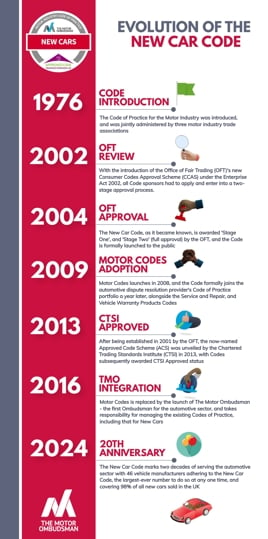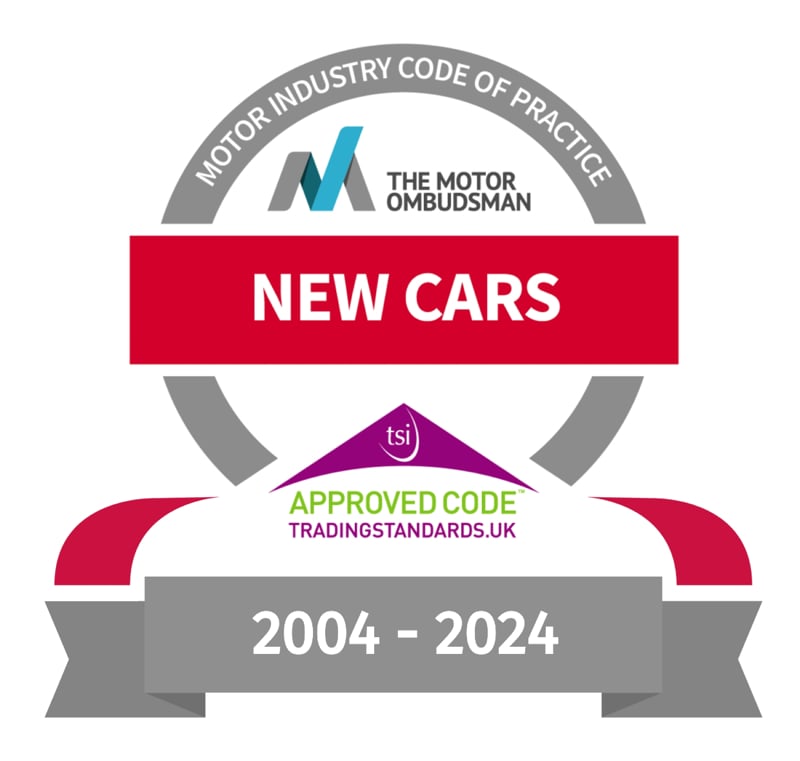Two decades since receiving the green light from the then Office of Fair Trading to act as the go-between for the car buyers and manufacturers, automotive watchdog The Motor Ombudsman is busier than ever.
Being given the official nod in September 2004 meant that the New Car Code was deemed to be effective in promoting and safeguarding the interests of motorists and provided added protection to consumers when buying a new car.
Following its introduction two decades ago, the New Car Code has since provided a reputable and established framework of comprehensive guidelines, designed to drive up standards in the supply of new cars and warranties.
 It is today one of The Motor Ombudsman’s four Codes of Practice to be approved under the existing Approved Code Scheme operated by the Chartered Trading Standards Institute (CTSI), and is today voluntarily adhered to by 46 vehicle manufacturers – the largest number to do so at any one time, and covering 98% of all new cars sold in the UK – a market worth around £70 billion.
It is today one of The Motor Ombudsman’s four Codes of Practice to be approved under the existing Approved Code Scheme operated by the Chartered Trading Standards Institute (CTSI), and is today voluntarily adhered to by 46 vehicle manufacturers – the largest number to do so at any one time, and covering 98% of all new cars sold in the UK – a market worth around £70 billion.
Disputes commonly reported by motorists relate to the provision of unclear manufacturer warranty terms, the management of complaints, delays to components being made available for repairs, and advertising potentially containing misleading information.
Speaking at a recent webinar, chief ombudsman Bill Fennell noted that new car complaints was rising in significantly. Last year, the ombudsman recorded approximately 3,400 new car disputes, a number that has now surged to around 4,000 so far in 2024.
“We saw an increase around 40% in the volume of cases coming into us in 2023, and we’ve seen a similar increase this year,” Fennell reported, noting that a significant factor contributing to the rise in complaints is consumers’ growing awareness of their rights.
Key drivers behind this trend include ongoing concerns over the cost of living driving consumers to seek resolution more aggressively. “Consumers are more inclined to pursue full refunds or vehicle rejections than they were pre-pandemic. This shift highlights a significant change in expectations following recent market challenges,” he added.
Fennell reported that 70% of new car disputes involved issues over manufacturers' warranties, often concerning paint quality, leather issues, or electronic malfunctions.
Complaints regarding how manufacturers handle these issues account for 14%, while advertising discrepancies - especially concerning electric vehicles - constitute 11%.
“A lot of that will be related, certainly on the electric vehicles, about range. When we get into the colder months, we see a lot of complaints coming about the advertised mileage versus actual performance,” he noted.
The New Car Code outlines a total of 30 commitments for businesses, which include using easy-tounderstand messaging in customer documentation and promotional material, presenting warranty terms in plain English and clearly listing any exclusions, and making spare parts available from the time a new model is launched.
Businesses equally promise to take effective action in order to ensure that consumers receive a fair and swift response should a complaint arise.
Since The Motor Ombudsman was formed in 2016, the automotive authority has received around 11,800 contacts from consumers on average every year, and accepted nearly 1,200 cases annually.
Commenting on the milestone Fennell said: “Celebrating two decades of the New Car Code is a testament to our sustained commitment to driving even higher standards in our industry. The guidelines highlighted by the Code are as relevant today as they were 20 years ago, and remain pivotal in the delivery of exceptional service by vehicle manufacturers.”

















Login to comment
Comments
No comments have been made yet.